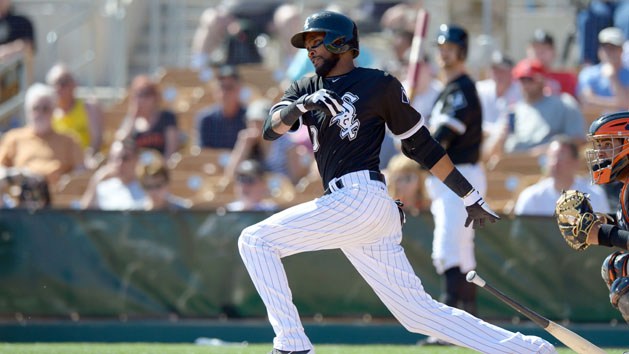
The White Sox made a four-year, $32.5 million investment in Alexei Ramirez prior to last season with the hope that the shortstop was just stepping into his prime — as an offensive threat as well as one of the majors top defensive infielders.
Year 1 worked out pretty well, as Ramirez, a 2010 Silver Slugger Award winner, drove in 73 runs last season, the most by an AL shortstop. He had a career-high 20 stolen bases (in 27 attempts) and batted .336 with runners in scoring position, which ranked 11th in the AL. But he also had a career low in batting average (.265), home runs (nine) and walks (16).
While the focus is improving some of those offensive numbers again, Ramirez also wants his defense to be more recognized, which means a Gold Glove on the trophy case. That’s why third-base coach Joe McEwing was spending so much time with Ramirez in early fielding drills this spring, as they are looking to make that next leap.
The other aspect of Ramirez’s game that they would like to see improve is his role as a leader. Entering his sixth season, Ramirez, 31, is deemed a player who could be a good leader, especially for the Spanish-speaking players and fellow Cuban Dayan Viciedo.
“He’s one of the premier shortstops in the league,” McEwing said of Ramirez. “He’s so talented, and it’s a shame he doesn’t get talked about with the elite shortstops in the game, because he is. Tremendous range, strong arm. He’s a special talent.”
One that McEwing, and especially manager Robin Ventura, can see only getting better.
“We all continue to learn and grow every day,” McEwing said. “Just being consistent from day to day, being locked in on every pitch. He made strides with that last year, and he made even bigger strides with that in spring training.”
Ramirez, nicked the “Cuban Missile” by former manager Ozzie Guillen, played in a 158 games last season and committed a career-low 12 errors. McEwing and Ventura each talked to Ramirez about the difference in errors, especially by a shortstop, who is the field general.
“Errors are going to happen,” McEwing said. “(But) make the aggressive error rather than the non-aggressive error. He can take it to another level.”
What they are not looking to change is Ramirez’s free-swinging approach at the plate. That’s who he is and who he has been since he arrived from Cuba before the 2008 season. That doesn’t mean that free swinging can’t have a purpose, however, especially when it comes to spraying the ball to all parts of the field. He showed that in the spring, especially driving the ball to right field.
“He’s more consistent in his approach driving the ball to right field,” McEwing said. “Instead of being pull-happy, he’s taking his hits to right. He is continuing to grow. He could be — and I think he will be — better than he has shown.”
Ramirez sure sounded like a player ready to carry that into the games that matter.
“All the things I wanted to do to prepare for the season I accomplished in spring training,” Ramirez said through a translator. “Now I want to get going.”
